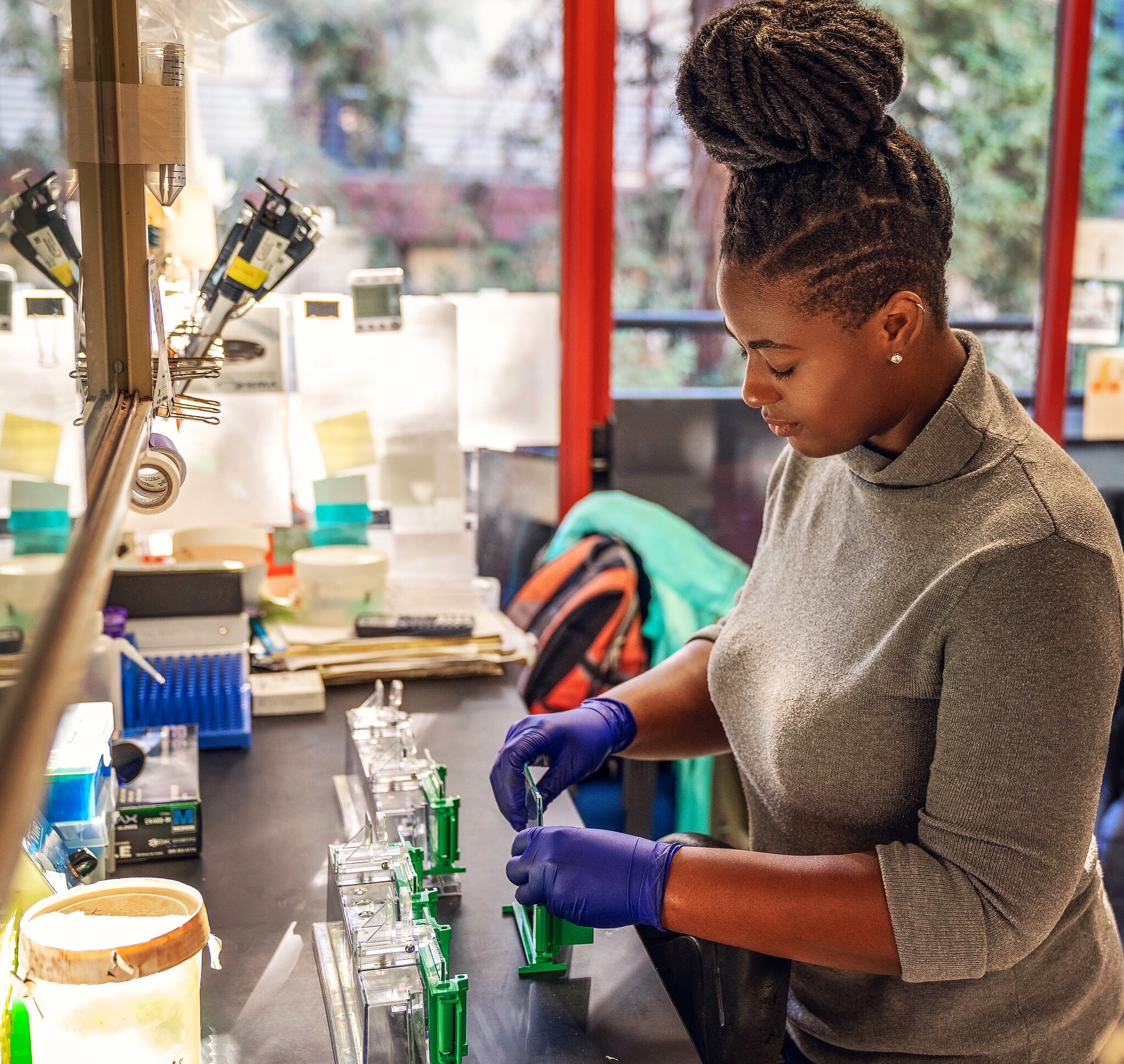
A Story Full of Texture and Color: One Scholar’s Work to Inspire Women in Science
Dorothy Tovar has been interested in science as long as she can remember, watching NatGeo and Animal Planet as a child. But her interests shifted specifically toward disease when she was 7 years old: While spending time with her grandparents in Haiti, she had a brush with an intestinal parasite. “It really stuck with me,” Tovar recalls. “On one hand, I was fascinated by the underlying biology; and on the other, I was really unsettled by the fact that living in certain countries puts you at risk of getting diseases that are unheard of in the developed world.”
Now a Ph.D. candidate in microbiology at Stanford University, Tovar conducts research aimed to reduce disease transmission into human populations. Her work looks at how bats respond to and transmit certain pathogens, an especially timely topic with the global COVID-19 pandemic. Tovar says that her 2013 Amgen Scholars experience at Stanford was a pivotal moment in her scientific path — leading her not only to want to pursue graduate school but also to decide to return to Stanford for her Ph.D. work.
“I had such a great experience in my lab and department as an Amgen Scholar, I knew I wanted to come back to Stanford,” she says. “Being able to spend a summer in the department I would eventually join gave me a good understanding of the culture and made me feel confident that it was a good fit for me.” She says that Amgen Scholars also helped her learn pivotal communications skills, including knowing your audience, telling a compelling story, and simplifying complex scientific content — skills that have continued to serve her throughout graduate school.
In her first two summers as a graduate student, Tovar was a program leader for the Amgen Scholars Program at Stanford. “It’s been so fulfilling to now help students who were in the same position I was only a few years prior,” she says.
I think authenticity is a key factor to truly inspiring others, because it deconstructs the lie that our mistakes and weaknesses disqualify us from doing great work and having an impact.
-Dorothy Tovar, 2013 Amgen Scholar
But that is not the only way Tovar has been giving back to the community. An IF/THEN ambassador, she is also serving as a role model to inspire girls to pursue careers in STEM. She was one of 125 women innovators selected from a pool of 700 applicants nationwide to be an ambassador. In this role, she has worked with partner organizations such as the Ad Council, Girl Scouts of the USA, and National Geographic — and has interacted with thousands of girls through Instagram Takeovers, Tik Tok videos, and YouTube Live sessions.
“My experience as an ambassador has been surreal,” Tovar says. “I’ve always really loved talking about science with others, but I think I wasn’t completely convinced that others would feel inspired by my story.”
At first, Tovar thought she had to present herself in a perfectly polished way, but she says that she has learned through these experiences that being herself helps her best connect with others. “I think authenticity is a key factor to truly inspiring others, because it deconstructs the lie that our mistakes and weaknesses disqualify us from doing great work and having an impact,” she says. “I have made countless mistakes, and still have many areas that need improvement. I spent so much time developing parameters around who I thought I should be, and what my life should look like for me to be successful; but my life is so much more textured and colorful than what I could have ever imagined. I hope that my story shows others that our texture, and sometimes messy colors, is what makes our successes beautiful and truly ours.”
As a black woman who is the daughter of Caribbean immigrants and a scientist passionate about health equity, Tovar has felt it hard to find a single mentor who “gets her.” But she says that the key to mentorship is finding great mentors: “And ‘mentors’ here is plural intentionally. It’s important to learn what qualities are essential for you in a mentor, and find multiple people with those qualities because it can be hard to find them all in one person.” Indeed, Tovar says that she jokingly refers to her mentors now as her “board of directors,” with each mentor offering something unique and them altogether providing the support she needs.
Tovar is focused right now on getting her last couple experiments finished before her Ph.D. program ends, which has been no easy task during the pandemic. “I’ve been forced to become a lot more agile in how I solve problems and get things done,” she explains.
The pandemic has also provided her an opportunity to explain the relevance of her research to human health. “It’s been very interesting to be a microbiologist studying bats as a reservoir for diseases during the COVID pandemic,” she says. “While there is still work to definitively identify the source of this coronavirus, bats are often included in the conversation. With this surge of interest in bats and disease, I have welcomed opportunities to talk with the public about how our interactions with the world around us directly impact our health.”

